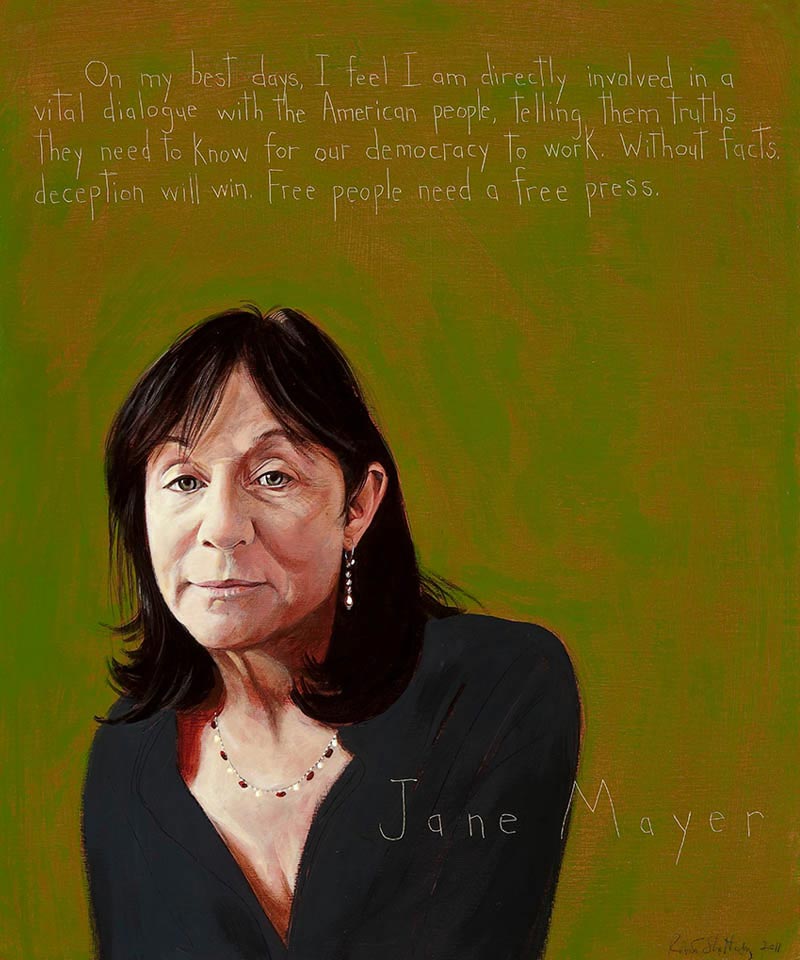
Jane Mayer
Investigative Reporter : b. 1955
“On my best days, I feel I am directly involved in a vital dialogue with the American people, telling them truths they need to know for our democracy to work. Without facts, deception will win. Free people need a free press.”
Biography
With her academic chops and journalist’s training, Jane Mayer is able to tell in-depth stories to the American public that otherwise would not get the treatment they deserve. By publishing stories The New Yorker about corporate influence on politics and government cover-ups, she enables the public to scrutinize current events and hold public officials accountable.
Mayer grew up in New York City and attended Yale College before continuing her studies at Oxford University in England. She began honing her journalism skills at Time magazine. In 1984, Mayer became The Wall Street Journal’s first female White House correspondent. She also took on duties at WSJ as a foreign and war correspondent. She covered the fall of the Berlin Wall, the last days of the Soviet Union, and the first war in the Persian Gulf. She joined The New Yorker magazine as a staff writer in 1995. Mayer has become known for her coverage of the War on Terror as well as her profiles of public figures, including, Sarah Palin, the Koch brothers, Osama Bin Laden, Art Pope and President George W. Bush.
Between 2001 and 2008, Mayer published a series of articles about the United States’ secretive War on Terror that ranged from allegations of torture to the machinations of the Bush administration´s inner circle.
When reports of unusual interrogation methods caught Mayer´s attention, she began investigating the role of psychology operations in the War on Terror, discovering a history that stretched back beyond the Cold War to World War II. Her research eventually led her to write and publish the 2008 book, The Dark Side: The Inside Story of How the War on Terror Turned Into a War on American Ideals.
The Dark Side revealed many unsettling facts about US government actions after 9/11. For example, she documented how warnings from government and military officials about the legal and moral risks of using torture were swept under the rug. Mayer´s reporting revealed that government officials knew that some of the things they were doing were illegal and, even as they did them, sought to protect themselves from future prosecution. Mayer´s research turned up no convincing evidence that the so-called “enhanced interrogation techniques” actually produced valuable intelligence in the fight against terrorism.
In a 2008 interview with Harper’s magazine, Mayer said that most political figures will never be held accountable for their behavior as long as the public believes they were acting in the country’s best interest. She said, “My guess is that the real accountability for President Bush will be in the history books, not in the courtroom.”
In a 2010 article in The New Yorker, Mayer detailed the influence of the billionaire philanthropist brothers, David and Charles Koch. Owners of an empire ranging from oil fields to industrial products, Koch money has been connected to a variety of libertarian, pro-corporate rights and anti-climate change think tanks and foundations. By funding think tanks, Political Action Committee (PAC) advertising, and providing financial support to academics who support their corporate interests, the Kochs´ money has had a significant impact on America´s political landscape.
Mayer’s writing and investigative journalism have earned her many accolades, including the Ridenhour Book Prize, Georgetown University’s Edward Weintal Prize, and a Guggenheim Foundation Fellowship. She was also nominated more than once for a Pulitzer Prize when she was at The Wall Street Journal. The Dark Side was a finalist for the National Book Award.
Mayer lives in Washington and writes for a number of publications in addition to The New Yorker, including the New York Review of Books and The Washington Post.
Programs
Americans Who Tell the Truth (AWTT) offers a variety of ways to engage with its portraits and portrait subjects. Host an exhibit, use our free lesson plans and educational programs, or engage with a member of the AWTT team or portrait subjects.

Education
AWTT has educational materials and lesson plans that ask students to grapple with truth, justice, and freedom.

Exhibits & Community Engagement
AWTT encourages community engagement programs and exhibits accompanied by public events that stimulate dialogue around citizenship, education, and activism.